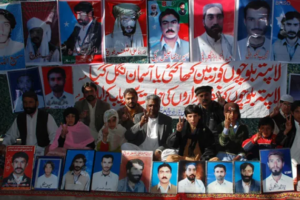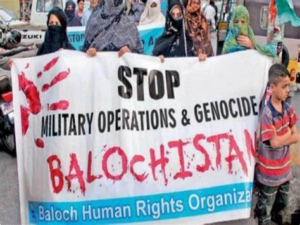
ENFORCED DISAPPEARANCE ON A FLAGRANT RISE IN BALOCHISTAN

The term “enforced” or “forced disappearances” refers to disappearances caused by the state in international human rights law. Now let us see what is this enforced disappearance in an elaborative manner.
An enforced disappearance occurs when a person is secretly abducted or imprisoned by a state or political organization, or by a third party, with the consent, support, or acquiescence of a state or political organization, and then no mention is made of the victim’s whereabouts or fate in an effort to shield the victim from the reach of the law.
People who have been forcibly removed from their families, friends, and communities are considered victims of enforced disappearance. They vanish when government agents take individuals off the street or out of their houses, deny taking them, or refuse to say where they are.
Armed non-state entities like armed opposition organizations have been known to carry out disappearances on occasion. And according to international law, it is always illegal.
In Balochistan, the issue of forced disappearances dates back to the early 2000s, when the Balochistan nationalism movement first gained traction. Balochistan has more than 5,000 persons missing.
TRACES OF PEOPLE ABDUCTED IN BALOCHISTAN:
HRCB data show that since 2016, the SFs have forcefully disappeared at least 3,738 individuals. These are 522 in 2016, 1,225 in 2017, 642 in 2018, 568 in 2019, 480 in 2020, and 301 in 2021 (according to data as of November 10). Only 453 of these 3,738 were made available. SFs, however, have killed at least 1,553 persons extrajudicially since 2016.
Abdul Wahab, a Baloch, was allegedly kidnapped by security forces (SFs) on November 12, 2021, while they were conducting a raid on his home in the Dera Bugti District. Muhammad Essa and Abdul Haq, two brothers, were forcibly abducted from their home in the Mashkay neighborhood of Awaran District on November 13, 2021, by death squad members who were supported by the SF.
Two people from Panjgur District were abducted by the SFs that same day. Rashid Hussain and Sajjad Baloch were recognized as them. According to the most recent allegations from July, the Baloch National Movement (BNM), a nationalist group seeking independence from Pakistan, said that security agents had abducted 46 persons, of which 28 had been freed after being tortured.
While this is going on, The Voice for Baloch Missing Persons (VBMP) asserts that over 45000 people have been forcibly abducted by the Pakistan Army and that over 5000 missing people have been “killed and dumped” during the past ten years. Most people agree that these are mostly the victims of the security agencies’ “kill and dump” operations, which target local Baloch dissidents and are concentrated primarily in the Southern region.
The Commission of Inquiry on Enforced Disappearances (COIOED) was established to investigate the matter in March 2011. 8,696 incidents of missing persons have been reported overall, according to data made public by COIOED in July 2022. The Afghan Diaspora said that 2,219 of these cases are still open while 6,513 of them have been resolved.

GROUNDS ON WHICH ENFORCED DISSAPPERANCE TAKES PLACE:
Disappearances are currently occurring all across the world in a variety of circumstances, although they were formerly mostly utilized by military dictatorships. In particular, governments attempting to suppress political opponents or armed opposition groups frequently carry them out during internal conflicts.
Regarding individuals who are taken up or who vanish, there is no set pattern. The primary motive of forced disappearances is to raise awareness of state atrocities. Journalists and activists from the Baloch community first vanished, only to be discovered dead in Sweden, Canada, and Azerbaijan under suspicious circumstances.
The use of this extrajudicial practice against those calling for social justice and equal rights spread to Balochistan. Many political workers, students, teachers, and activists who sought to aid the poor or seek fundamental liberties and rights for Baloch communities were targeted despite their lack of any wrongdoing.

In every instance that Human Rights Watch documented, the security personnel never introduced themselves, gave an explanation for why the individual was being arrested, or indicated where they were bringing the subject.
The person being arrested was frequently abused, shackled, and blindfolded before being carried into the cars of the security personnel. In every case that Human Rights Watch looked into, freed detainees and families who were able to gather information about detainees’ treatment reported being tortured and mistreated.
The use of sticks or leather belts for beatings was a common kind of torture, as were hanging prisoner’s upside down and depriving them of food and sleep for extended periods of time.
The sense of unease and worry it inspires impacts communities and society as a whole, not just the immediate family members of the missing. In order to create panic throughout society, forced disappearance is frequently utilized as a tactic.
The 132-page report, “‘We Can Torture, Kill, or Keep You for Years’: Enforced Disappearances by Pakistan Security Forces in Balochistan,” details the forced disappearances that Pakistani security forces committed there.
VIOLATION OF THE RIGHTS OF THE DISAPPEARED PEOPLE:
The Universal Declaration of Human Rights (UDHR) of the United Nations states that many fundamental human rights are violated when people disappear. These include the right to liberty, the right to personal safety and humane treatment (including the right to be free from torture), the right to a fair trial, the right to legal representation and to equal protection under the law, as well as the right to the presumption of innocence for the person who has vanished.
These are the basic fundamental rights that gets violated when a person is disappeared forcefully. Their families, who frequently spend the rest of their lives trying to learn more about the missing, are also victims.
The effect of disappearances is twofold: in addition to silencing those who have already been opposed or criticized, they also silence others by instilling a sense of dread and uncertainty among the general populace.
The “Criminal Law (Amendment) Bill 2021” was introduced by the Pakistani government in the National Assembly, making forced disappearance a crime with a 10-year prison sentence as the penalty.
EFFECT OF ENFORCED DISSAPEARANCE:
The life of the victim’s loved ones and the communities in which they live are drastically affected by the victim’s forced disappearance.
Families frequently struggle psychologically to accept and come to terms with the absence of their loved ones. Numerous people experience extreme psychological distress, which can occasionally lead to physical sickness. Children are not immune to such suffering; the loss of a parent, sibling, or other family members frequently has a negative impact on their social skills and academic achievement.
Families frequently go unrecognized for their societal and cultural isolation. Wives of victims who have vanished, for instance, are occasionally left in limbo while widows in some cultures have a well-established support structure within communities.
CONCLUSION:
On October 21, 2022, the National Assembly passed a bill for the second time that would have made forced disappearances a terrible crime. This was done by eliminating a contentious portion that would have punished people who filed false reports.
A significant infringement of human rights is forced disappearance. It is seen as a crime against humanity when done repeatedly to civilians. States are required to combat enforced disappearance on their respective territories under the 2010 International Convention for the Protection of All Persons from Enforced Disappearance.
It specifically upholds people’s right to discover what happened to their missing relatives, as well as their right to justice and compensation. Thus, enforced disappearance is huge crime against humanity which needs to be stopped in an immediate basis.








